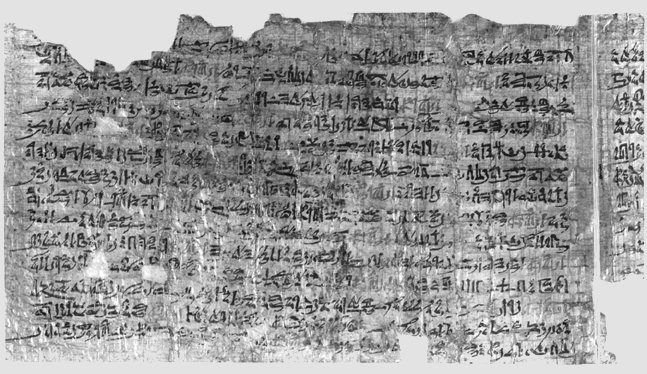Admonitions of Ipuwer Papyrus 3-6-10-
No one sails north to Byblos today. How shall we replace for our mummies the cedar wood, the importation of which makes possible the making of coffins of the priests. The kings as far away as Crete are embalmed in the pitch which is taken from these same cedars.
The Admonitions of Ipuwer refers to the fact that many Asiatics have become assimilated to Egyptian culture and have displaced Egyptians in places of authority. This is suggested by the statements, “Foreigners have become people everywhere” (1-9), and “there no Egyptians anywhere” (3-2). At first these statements seem to be quite ambiguous. Yet it is clear that the writers of Merikare and the Story of Sinuhe considered the Asiatics, “Amu, entirely distinct from the civilized Egyptians in appearance and behavior. The statements about foreigners becoming Egyptians can only refer to the Middle Kingdom Asiatic assimilation to Egyptian culture, when Asiatics in government and religious institutions rose to positions of honor and authority. The statement, “there are no Egyptians anywhere” must mean “anywhere important.” The fact that some of the pharaohs of the Thirteenth Dynasty bear Semitic names was noted above; it is entirely possible that there were others with purely Egyptian names whom we cannot identify as foreigners.
The Admonitions of Ipuwer represents the frontier in the northeast as open to Asia, and bedouin in numbers are found throughout Egypt- “The Desert is throughout the land…a foreign tribe from abroad has come to Egypt” (3-1) and “the entire Delta will no longer be hidden; the confidence of the Northland is a beaten path” (4-6).
Every man fights for his sister and he protects his own person. Is it the Nubians? Then we shall make our own protection. Fighting police will hold off the bowmen. Is it the Libyans? Then we shall act again. The Madjayu fortunately are with Egypt. How could any man slay his own brother? The military classes which we marshal for ourselves have become bowmen beginning to destroy that from which they took their being and to show the Asiatics the state of the land. And moreover all foreign lands are afraid of him.
This passage seems to present striking similarity to the situation presented by the Execration texts in which Egypt’s three neighbors and traditional enemies are said to be threatening her frontiers.
Van Seters, John, The Hyksos; A New Investigation. New Haven- Yale Univ. Press, 1966.
